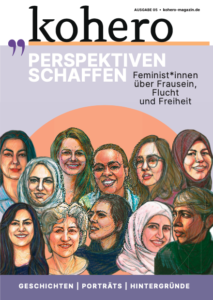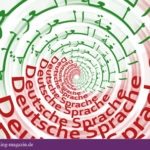Maniza Khalid talks about her engagement for LGBTQIA+Muslims and the book “Queer Muslim Futures“. It is about her dream of future. The 24 years old female author lives in Delhi, India. The talk is led by Jenny Fleischmann vom kohero Magazin.
Who are you? How would you describe yourself?
Maniza Khalid: I’m Maniza and I generally feel out of place – doesn’t matter where I am, it could be a café I like or my own bed. I’m flickering between this realm and others. To keep myself grounded in this plane of reality, I drink excess tea and coffee. Also, I’m non-binary (they/she) and bisexual.
How are you at the moment? What is on your mind at the moment?
Manihza Khalid: Predictably so, I’m drinking a strong Darjeeling, this rainy morning in Delhi. I’m thinking of how ordering dry cat food for a sweet little ginger cat who’s started to cozy up to me. I recall my childhood with cats and attempt to segregate my love for felines from my discomfort at remembering anything at all from my younger days.
What does feminism mean to you?
Maniza Khalid: I’d say it’s a political movement to me. I try to be as inclusive and mindful of intersections as I can. My perspective is shaped by academia in India and literary theories that delve into feminisms. I use the plural here because there exist different waves and culturally-specific movements of feminism.
How are you involved in feminism?
Maniza Khalid: I think everyone is involved in feminism – They either embody a particular kind of feminism or they react against it when they believe in the mistaken notion that feminism is about male-bashing. I’m rather fond of the ‘angry, hairy, man-hating d*kes’ stereotype. A little light-hearted misandry never hurt cis men. I’m also more comfortable with intersectional groups because it’s important to weave in other intersections of identity, to grasp at the complexity of social stratifications.
In India, there exist groups founded on Dalit feminism or Muslim feminism, as being Dalit/Muslim renders one at a disadvantage. I’m certain that trans-inclusive queer feminism is a different strain from the one that is marketed by Bollywood. Our feminisms are largely informed by our own identity, which is why dialogues are important among intersections. I make sure to do my reading, research and I like to write. I like to share reviews of films, art and poetry. Without deliberate effort, I’m involved in feminism through critical engagement with everything I encounter.
What is the queer Muslim project about and how are you organized?
Maniha Khalid: The Queer Muslim Project is a youth-led online network of LGBTQIA+ Muslims, with a global community of over 22,000 people and counting. We work with LGBTQIA+ Muslim individuals to challenge fear, stigma and violence through affirmative art practices, digital storytelling, inclusive faith-based dialogue, identifying suitable legal and mental health support, and creating safe online and offline community spaces. Currently, most of the work we do is online as COVID19 swept through countries. For now, we are a small team that dedicates all time and energy to online events, publications, documentations and collaborations.
How did the book „Queer Muslim Futures“ come about and what is the book about?
Maniza Khalid: “Queer Muslim Futures” is inspired by a workshop series we organized in collaboration with the Fearless Collective. These workshops were a dream tank of sorts through which we created: poetry, self-portraits of future Queer Muslim avatars, writings, musings, a journal written in the future, mythologies, rituals, and more that define and affirm the safe and sacred futures participants want to create and inhabit.
Our publication is inspired by the conversations and discourses that the workshop allowed participants to delve into. It includes selected self portraits and writings produced during the span of the workshop. It also features visual art, speculative fiction and essays, inspired by the events of the workshop and the larger theme of Queer Muslim Futures. Therefore, it functions as an archive in history, a record of Queer Muslim art; at the same time, it is also a freely-available resource for those interested in reading about Queer Muslimhood, Futurism and related politics.
What did the process of making it feel like for you?
Maniza Khalid: Reya Ahmed and I worked together to breathe life into concepts that interested us during the workshop. She documented cues through visual art and I documented through writing. Some ideas stayed with us, for e.g. the Queer Nani fascinated us because the privilege to grow old as a queer individual is a dream for most LGBT+ folk. So she was given a story and portrait. She is asexual, single and has a candied home to subvert the notion of the unfriendly witch who lives alone in the woods.
We were fascinated with ‘the Map of Shared Dreams’ as Reya drew it live, while participants shared cues. I enjoyed expanding on ‘The Politics of Smell’ and ‘Renaming’ with a cultural and historical analysis of each, as I finally had time to theorize. We explored the potential of our notes from each session, as there were so many wonderful ideas that were yet to be explored. Rafiul, who also facilitated the workshops, edited and curated the book. We worked together as team to modify the text in several rounds.
What does your dreamed future look like?
Maniza Khalid: In my dreamed future I do not feel guilty of who I’m growing into. I am friends with all that I was once afraid of. In this world of cleaner air and water, bureaucratic procedures are transparent. I too do not romanticize secrecy because I no longer live in hiding. Like any dreamer, I imagine a home I can call my own. There is great beauty all around and I feel deserving of it; I do not have to ‘earn’ my worth through overachieving. I am grateful and pray to what I love, in my own language.
Would you like to read more about inspiring feminists?
In our magazin PERSPEKTIVEN SCHAFFEN/CREATING PERSPECTIVES
you will find a collection of moving and fascinating stories from Germany and the world. The magazine is written in German.
To read or to give away:
Order via email to abo@koheromagazin.de







